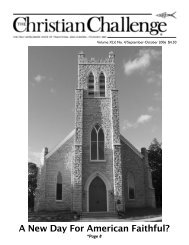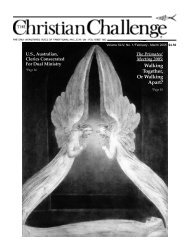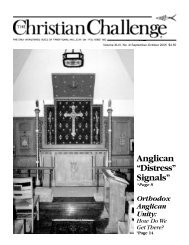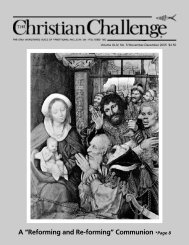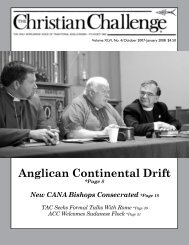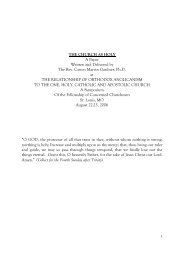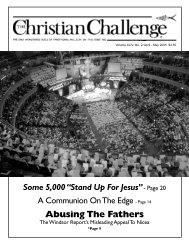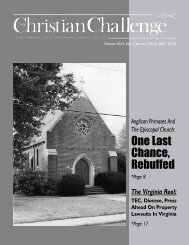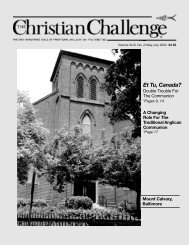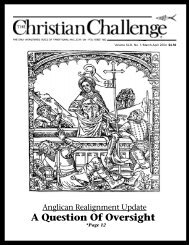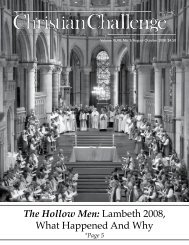Church Planting For The 21st Century - The Christian Challenge
Church Planting For The 21st Century - The Christian Challenge
Church Planting For The 21st Century - The Christian Challenge
Create successful ePaper yourself
Turn your PDF publications into a flip-book with our unique Google optimized e-Paper software.
ishops; Chislett’s ACA bishop removed him from his parish.<br />
Nevertheless, he has had an active episcopal ministry since<br />
his consecration.<br />
In an apparent sign of tensions within the ACA, Bishop<br />
Davies continues to support joint FIF/TAC efforts to provide<br />
alternative oversight, and hosted a reception for Bishops Robarts<br />
and Entwistle, but did not join in their consecrations, in<br />
accord with a pledge to brother ACA bishops. He also told the<br />
latter that Bishops Chislett, Robarts and Entwistle may now<br />
perform only occasional priestly functions in his diocese.<br />
HOWEVER, the chairman of FIF-International, the<br />
<strong>Church</strong> of England’s Bishop of Fulham, John Broadhurst,<br />
sent a letter of support for the consecration of Robarts and<br />
Entwistle. “It has long been clear to me that the treatment<br />
afforded to members of <strong>For</strong>ward in Faith-Australia by the<br />
[ACA] has left you with little option but to pursue the course<br />
you have chosen,” Broadhurst wrote the two men. “It is,<br />
then, my fervent hope that your future ministries will be<br />
richly blessed as you endeavor to serve all faithful Anglicans<br />
throughout Australia and that we will continue to work in<br />
close collaboration in the years to come.”<br />
In testimony last February before the Bishop of Rockhampton’s<br />
committee examining provisions for ACA members opposed<br />
to women’s ordination, Fr. Robarts stated that assurances<br />
of a “tolerable pluralism,” dialogue, and a “respected place in<br />
our church” for traditionalists had proved “patently false.”<br />
FIF-Australia’s National Council nominated Robarts and<br />
Entwistle for the episcopate following the refusal of the<br />
Diocese of Perth to make provisions for those opposed to<br />
women’s ordination. In November 2005, the organization’s<br />
National Assembly endorsed the consecration of both men to<br />
serve FIF-Australia congregations in the southern and western<br />
parts of the nation. (Earlier supported for the episcopate by<br />
FIF-Australia, Chislett tends the northern region.)<br />
In consecrating the two new bishops, Archbishop Hepworth<br />
was assisted by Bishop Chislett; Bishop Stanley Goldsworthy,<br />
sometime Anglican Bishop of Bunbury; and two<br />
bishops from TAC’s <strong>Church</strong> of the Torres Strait (islands off<br />
northeast Australia): Bishop Tolowa Nona, SSC, and Bishop<br />
Sania Townson.<br />
With these consecrations, “it will now be possible to provide<br />
episcopal ministry for hurting and marginalized Anglican<br />
Catholics throughout Australia, gathering them into regions,<br />
and resourcing them for their life and witness in Christ,”<br />
Chislett said.<br />
A FORMER DEAN of Perth, Bishop Robarts, 74, served<br />
several parishes in the ACA, and was vicar of Christ <strong>Church</strong>,<br />
Brunswick, in the Diocese of Melbourne at his retirement in<br />
2003. In September 2003 he was invested with the Medal of<br />
<strong>The</strong> Order of Australia “<strong>For</strong> service to religion particularly<br />
through the Anglican <strong>Church</strong> of Australia.” A native of Britain,<br />
Bishop Entwistle, 66, served <strong>Church</strong> of England parishes<br />
and various chaplaincies for 18 years before becoming chief<br />
Anglican chaplain of the Western Australia prison service. In<br />
April, he resigned as vicar of St. Patrick’s, Mount Lawley,<br />
Western Australia, to take up his new post. Both bishops are<br />
married. n<br />
Sources included FIF-Australia, <strong>The</strong> <strong>Church</strong> of England Newspaper, <strong>The</strong> Patmos Review<br />
ARCHBISHOP WILLIAMS and Pope Benedict XVI during their November<br />
encounter in Rome. Photo: Anglican Communion News Service/J. Rosenthal<br />
Williams, Pope, Acknowledge<br />
“Obstacles,” But Sign Declaration<br />
Report/Analysis By Lee Penn<br />
“Serious obstacles” stand in the way of unity between the<br />
Anglican and Roman Catholic <strong>Church</strong>es, the Archbishop of<br />
Canterbury and Pope Benedict XVI acknowledged at their<br />
November meeting in Rome.<br />
Yet Archbishop Rowan Williams also made a “joint declaration”<br />
with Benedict that appears to set him alongside Rome,<br />
and against liberals in his own communion, on church-dividing<br />
moral issues.<br />
<strong>The</strong> visit was a continuation of a long era of ecumenical<br />
discussion that began when Paul VI and Archbishop Michael<br />
Ramsey met in 1966. But the dialogue has been jeopardized<br />
by the ordination of women priests and bishops in some of the<br />
38 Anglican provinces and the consecration of a gay bishop<br />
in the U.S.-based Episcopal <strong>Church</strong>.<br />
Archbishop Williams, in his first formal audience with Pope<br />
Benedict XVI, expressed his desire for reconciliation, and<br />
awareness of the barriers to it. He said he was ready “to hear<br />
and to understand” the Pope’s concerns about the Anglican<br />
Communion’s direction.<br />
And the Pope, while signaling a desire to continue ecumenical<br />
dialogue, bluntly told Williams: “Recent developments,<br />
especially concerning the ordained ministry and certain moral<br />
teachings, have affected not only internal relations within<br />
the Anglican Communion but also relations between [that]<br />
Communion and the Catholic <strong>Church</strong>.” <strong>The</strong> current Anglican<br />
discussions of these matters, which are of “vital importance<br />
to the preaching of the Gospel in its integrity,” will “shape<br />
the future of our relations,” he went on.<br />
“It is our fervent hope that the Anglican Communion will<br />
remain grounded in the Gospels and the Apostolic Tradition<br />
which form our common patrimony and are the basis of our<br />
common aspiration to work for full visible unity,” Benedict<br />
continued. “<strong>The</strong> world needs our witness and the strength<br />
which comes from an undivided proclamation of the Gospel...<br />
→<br />
www.challengeonline.org <strong>The</strong> <strong>Christian</strong> <strong>Challenge</strong> November-December 2006 7



